
We interviewed Peter Loo and Sarah Patton of Plan C, a nation-wide anti-capitalist organisation in the UK. They were both in Rojava from October 2016 to June 2017 and were based mainly in the city of Qamislo.
1. Can you tell us first what Plan C is?
Plan C is a national anti-capitalist organisation here in the UK. We started the discussions which would lead to our group forming in 2010-2011 during the student protests of that time. Whilst the Conservative party’s HQ was being ransacked and universities went into occupation, the radical left seemed to be absent. We saw the need for an organisation which was neither an anarchist network or a Trotskyist party. Whilst we have a high degree of pluralism in our organisation, we think loosely labelling our politics as libertarian socialist with an emphasis on base organising might help explain us to international comrades. Beyond Rojava work we help organise precarious workers in the gig economy, have helped found branches of a national tenants union, participate in lots of debate, run a festival, and support practical anti-fascist work.
<figure>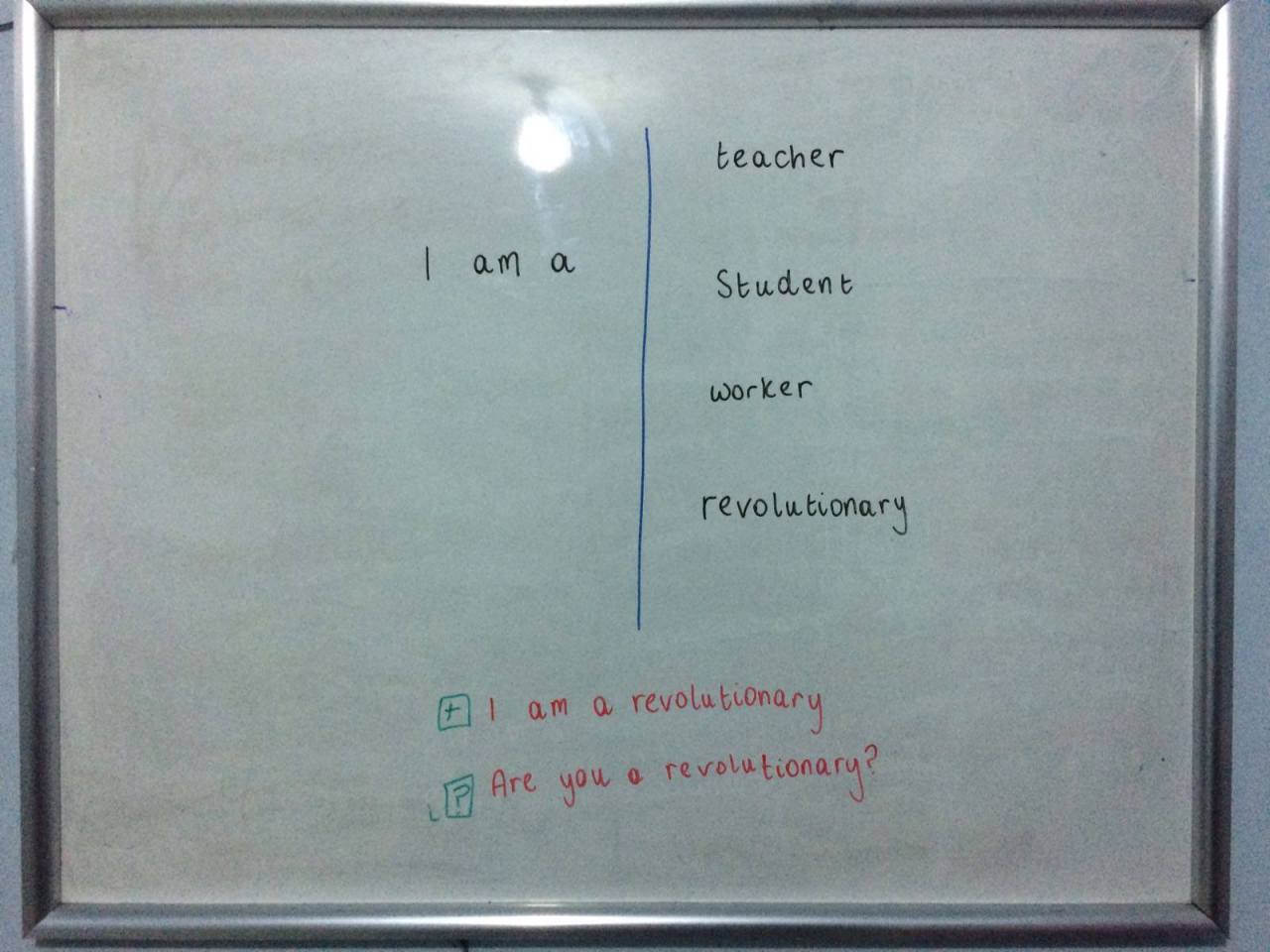

2.
Why and how was the Plan C Rojava solidarity cluster
founded? What are you doing? What is working well and what have been the
biggest challenges?
We
founded the Plan C Rojava solidarity cluster in 2015. Like many, we had been
inspired by the heroic defence of the city of Kobane against Isis. Like many,
we were surprised and amazed to encounter a revolution such as the one in
Rojava which we had known nothing about. We formed the cluster to organise
solidarity activity at the national level, and support our local work. As well
as sending members to volunteer in civil society, two of whom have returned and
a third who is still out there, we have organised fundraisers, talks, and
helped organise local and national demonstrations. During a trip to Kobane we
saw the school bus we had helped fundraise, which was a really nice thing to
see. We have helped to form city-based solidarity groups with a mixture of
British and Kurdish comrades. Sending volunteers was the natural development
and outcome of the work we had done so far.
Unlike other countries such as Germany, the connections between the British
left and the Kurdish community and political structures were pretty much
non-existent in 2014. We are making good progress in building these links and
developing our capacities together. More and more people in society and the
left are familiar with the Kurdish struggle. Still there is much more that
needs to be done! Whilst we have sent some members and relatively large amounts
of money for our size there is always more that could be done.
We are also grappling with what we can take from the struggles in Kurdistan and
bring back into our own organising here, we learned a lot from our comrades in
Rojava and hope we show the same level of dedication and commitment in our work
in the UK. We are also always looking for opportunities to bring our Kurdish
comrades into the struggles of the UK. Recently we organised a bloc on an
anti-Conservative Party demonstration gathering members of Plan C, the local
community and the Kurdish community together, this is something new in the UK
and we were happy to have helped co-ordinate this.
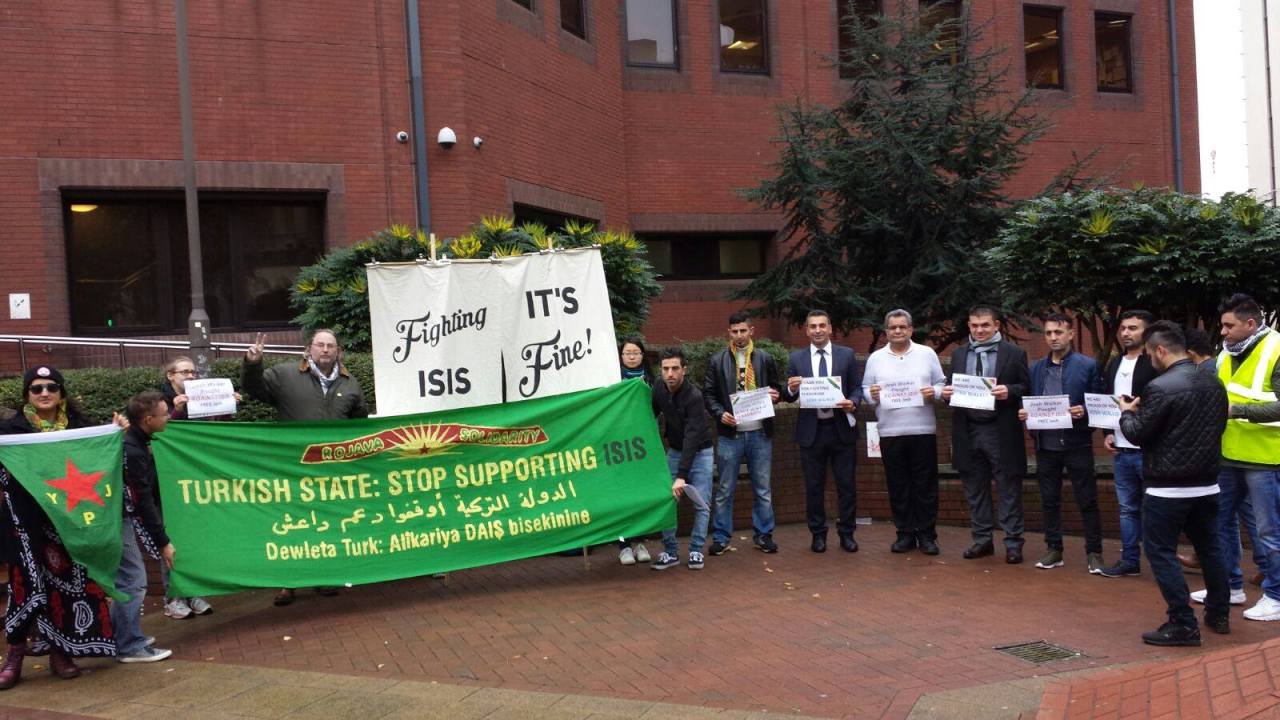 </figure>
</figure>
Photo: Solidarity with British YPG volunteer Josh Walker, who faced terrorism charges in the UK.
3. What were your first impression(s) of Rojava? What
kind of activities have you participated in? Did you work with one or many
specific local groups? And what do you think the international solidarity
movement should do now and in the future?
We
spent 9 and 6 months respectively working in civil society in Rojava. We were
based in Qamishlo, a city which still has some presence of Assad forces and the
Regime in it.
We worked in a TEV-DEM institution, primarily starting and running an English school but also participating in local campaigns to encourage the support and development of the commune system and within the woman’s struggle. We participated in our local commune which was an inspiring and empowering experience, and taught lessons to various institutions within the city such as the worker’s committee, the diplomacy department, women’s organisations and our local hospital.
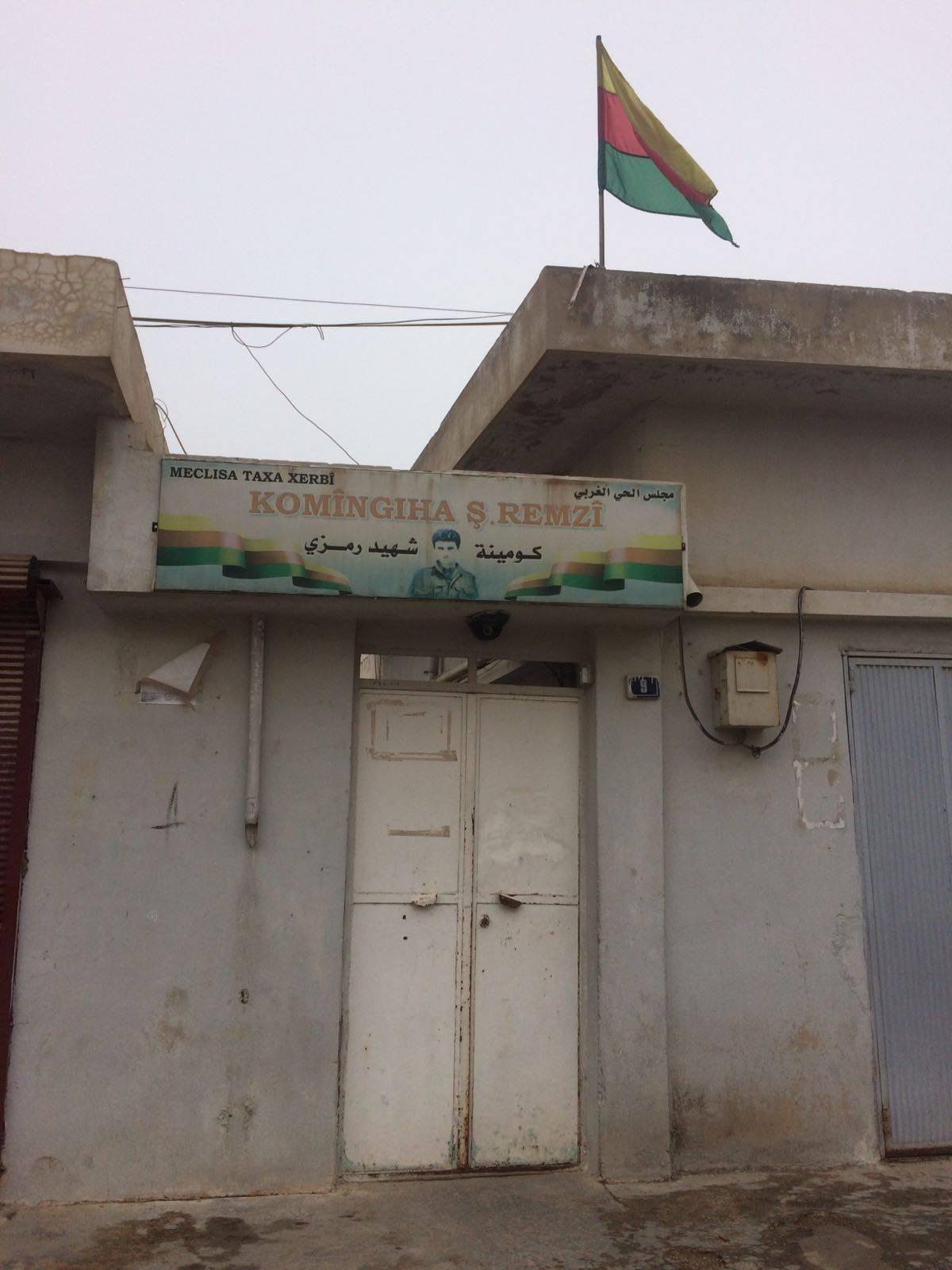
Photo: Peter Loo and Sarah Patton’s local
commune. They wrote about a meeting held before the Kurdish new year, Newroz:
“there were still about 30 people in attendance (from a total of about 150
families in the commune). After
a short presentation about the current political situation, we heard reports
from the health,
security, and education committees (other members of the commune couldn’t make
it to deliver reports from other committees). The body of the meeting centred
on plans for Newroz, and frustrations about the necessary security measures for
the day, as well as the beginning of weekly education sessions (first topic
still tbd)…Those in attendance were surprised when we told them politics didn’t
really look like this in the UK!”
One of the largest changes that has been made, and which we had totally underestimated, was outlawing polygamy. Many of the women we spoke to said this was the largest improvement in their lives. Wives were no longer living in fear of their husband taking another wife, relegating them permanently to the role of cook and childminder. Combined with legalising divorce these legal changes have given women a lot more autonomy. Some of the men Peter spoke to would confess this was a source of real annoyance for them so it was obviously working!
Of course, things aren’t perfect and there is still a long way to go. Our favourite example of this is from a discussion that occured in our neighbourhood just after international working women’s day. One of our students explained she had stayed at home looking after the children whilst her husband, a member of TEV-DEM attended the celebrations himself! Through discussing this she realised how wrong this was and challenged him that evening, we hope next year she is at the (huge) celebrations herself!
Reassuringly we were not massively surprised by many of the things we saw when we arrived in Rojava. If anything, we were surprised by just how far some elements of the Revolution had developed. In particular the development of the women’s Revolution was surprising. Both the breadth and depth of this revolution against patriarchy impressed us. We expected to encounter more examples of tokenism and resistance from men but instead were met with a revolution that gave the utmost importance to feminism and the position of women in society.
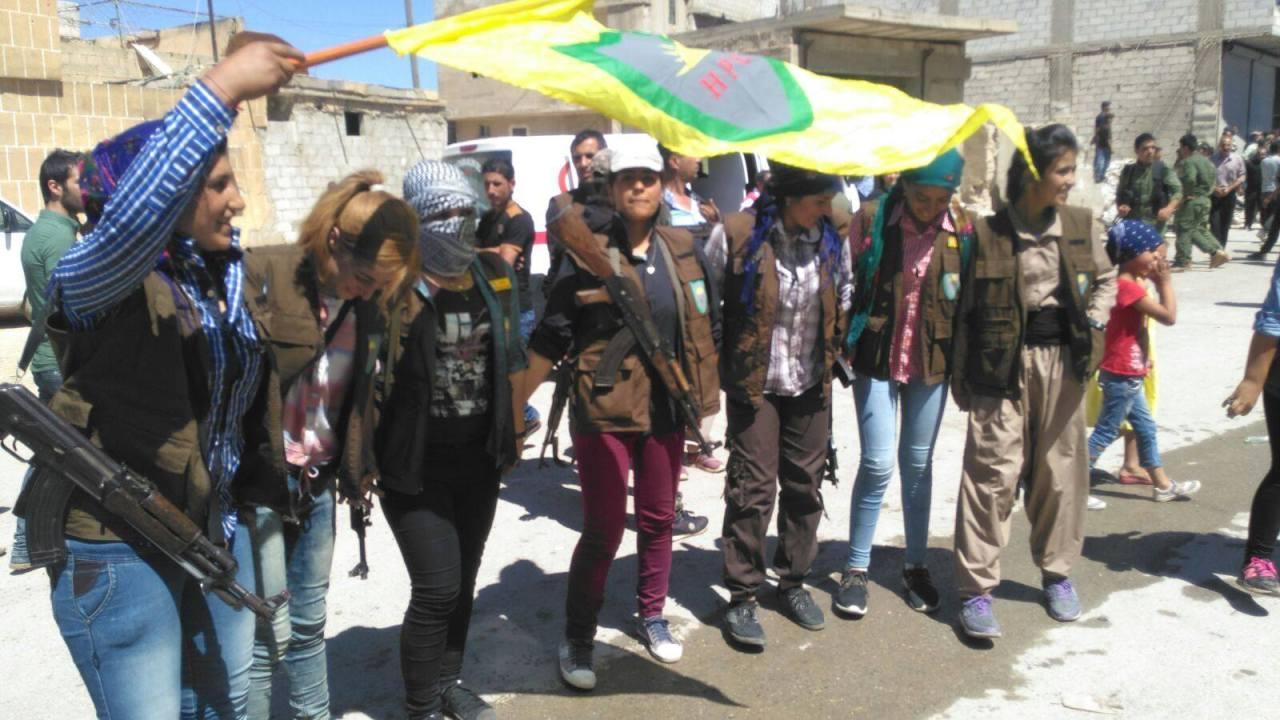
One of the most headline grabbing parts of the revolution and the fight against Daesh has been the presence of women guerrillas and soldiers, in the western media images of beautiful young Kurdish women with guns are prevalent. There is no doubt that the military aspect of the women’s revolution is integral- part of women’s liberation must be giving equal access to weaponry and the means of self-defence, particularly in a war! This feminism on the front line is backed up by tireless work in civil society. Every position of authority has male and female co-chairs, every council must be at least 40% women or it ceases to go forward, and there are hundreds of education and training initiatives aimed at giving women the tools they need to lead, and the knowledge they may not have been able to access pre-revolution.
There
are ‘women’s houses’ in every neighbourhood that tackle problems ranging from
domestic violence to child care and new laws that forbid the practise of
polygamy, a change that all the women we spoke to welcomed. There are of course
still issues, for example we once went to our local commune and found there
were very few women- they were at home because they had to look after their
children. Some of our comrades chided their husbands and decided to work on
providing childcare. It is important to recognise that this revolution and
these changes to society are happening in a war-time situation and, even if
this were not the case, real change happens slowly.
4. What did you learn
Well perhaps it is more accurate to say what did we re-learn! Firstly we
(re)learnt that revolution is possible. We must continually remind ourselves of
this truth. Rojava is a reminder that where people organise and struggle,
revolution is always possible. Secondly, that it is not just ideas which help
support for a revolution. The support that has been built for this Revolution
amongst the people has been built on several levels.
1) An ideological vision of a progressive and fair world with democracy, ecology, and women’s rights at its centre connected to a strong critique of capitalism and imperialism.
2) The reliable provision of security and the basic necessities such as subsidized bread and oil.
3) A series of effective “transmission belts” for the Revolution which bring people into contact with the ideas and functions of it. Primarily we are thinking of the communes at the street level and both the People’s and women’s houses at the neighborhood level. There is also a vibrant political popular culture with various festivals celebration and Remembrance days and music and theatre.
4) The role of the organised Kurdish liberation movement can also not be understated. We felt humbled by the incredible comrades and organisers we met in our time in Rojava. The bravery, discipline, dedication, and passion for the development of everyone in this society was inspiring. Without the organised Kurdish liberation movements this Revolution would not have happened and would certainly have buckled in the face of such fierce opposition from both Isis and regional powers.
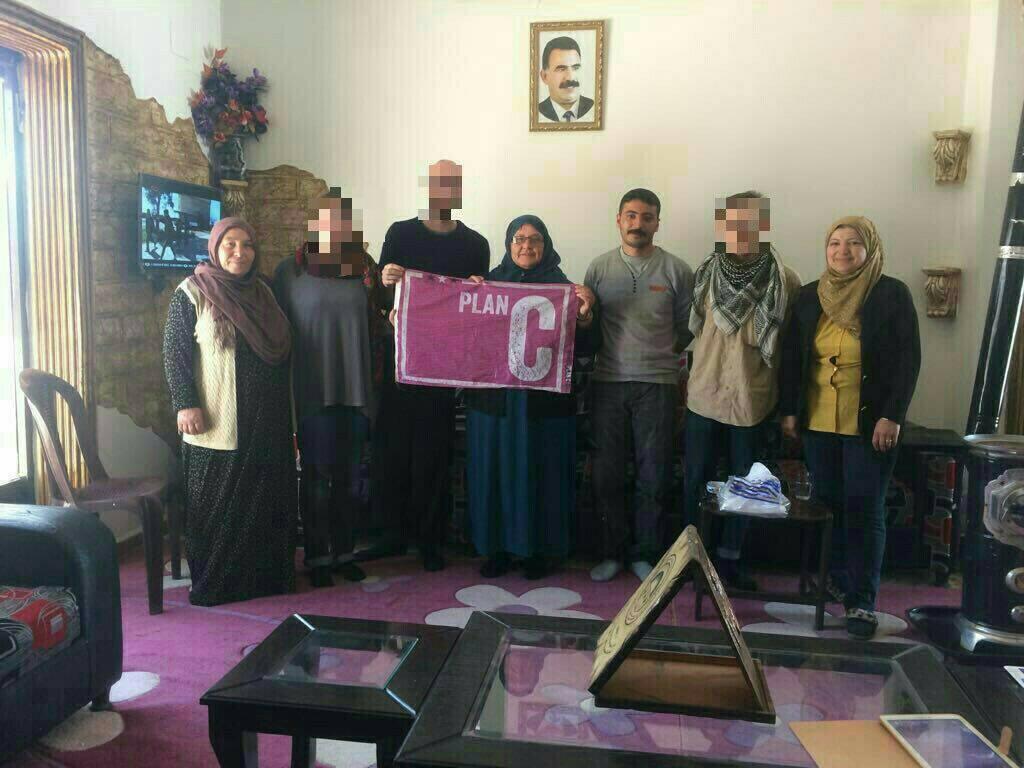
Photo: Plan C interviewing their local Mala Jin (women’s house): “Common problems they are organising against include domestic violence, polygamy, and forced marriages. Our local Mala Jin works on at least 15 cases a week and is an important resource for women fighting for their freedom.
The interview was incredibly inspiring. Heval Jiyan Ciwan, who is holding our flag with us, is the head of this Mala Jin and has been an organiser in Qamishlo for 25 years and was arrested and jailed by the Assad regime before the revolution. The heval on the far left has lost one son in the fight against ISIS and her other two sons are currently serving in the Raqqa campaign. She told us that her work here is as important as the fight on the front lines.”
5. In Finland people have had a hard time in deciding what would be the best thing to do for solidarity with Rojava. In your opinion what are the best ways people from Europe can support the Rojava revolution abroad and in Rojava?
Depending on which country you are in the first challenge is always raising awareness in both the left and in society whilst building connections and projects with existing Kurdish structures. These structures will usually have a strong idea of what could be most useful. Some of the major problems the Revolution is facing are international ones, particularly the role of Turkey in the region. Applying diplomatic pressure on Turkey from your home state is one thing we can do here in Europe.
The Revolution in Rojava does need volunteers. If you have a skill which is useful in civil society and are interested to go we suggest you make contact with your local pro-Rojava Kurdish groups or organizations. Be aware this can be difficult, projects can take time to set up and resources are scarce. Any resources you can bring with you and any preparation you can do, for example learning some Kurdish, will pay off during your time in Rojava. This article is worth checking out. Whilst we don’t agree with all of it, we think the actual organised structures in Rojava should be supported and TEV-DEM should be seen as part of these structures, it has points about the practicalities of volunteering etc.: https://www.weareplanc.org/blog/what-do-you-mean-you-support-rojava/.
The revolution, despite being under embargo, always needs money and equipment. We would recommend caution however, before donating money pay attention to who is asking, what they are asking for, and why. A common dynamic is that of fundraising projects started or supported by English speaking supporters raising sometimes disproportionate amounts of money. We have seen several campaigns to equip Western military volunteers (who will be equipped by the YPG/YPJ anyway), and even to fly home some western volunteers rejected by the YPG on political grounds! We would recommend those of you planning fundraisers to speak to the Kurdish structures for guidance on where to send money. Of course sending money or resources at the moment is difficult due to the Embargo. If in doubt donating to the Kurdish Red Cross is always a good idea.
People with medical or engineering skills are in high demand, though being in demand and being put to useful work are different things. Through the right structures English teachers, particularly trained and/or experienced ones are useful. Learning English allows people to communicate the reality of the revolution to the outside world and broaden their own horizons. We found that a 6-month stay is almost certainly not long enough for the structures to place you somewhere useful, for you to learn the culture and some language, and to achieve some meaningful work. If you can’t commit to much more than 6 months, having planned handovers, or looking for people to carry on your work when you leave, is also very useful. We were able to do this with a comrade of ours from Plan C.
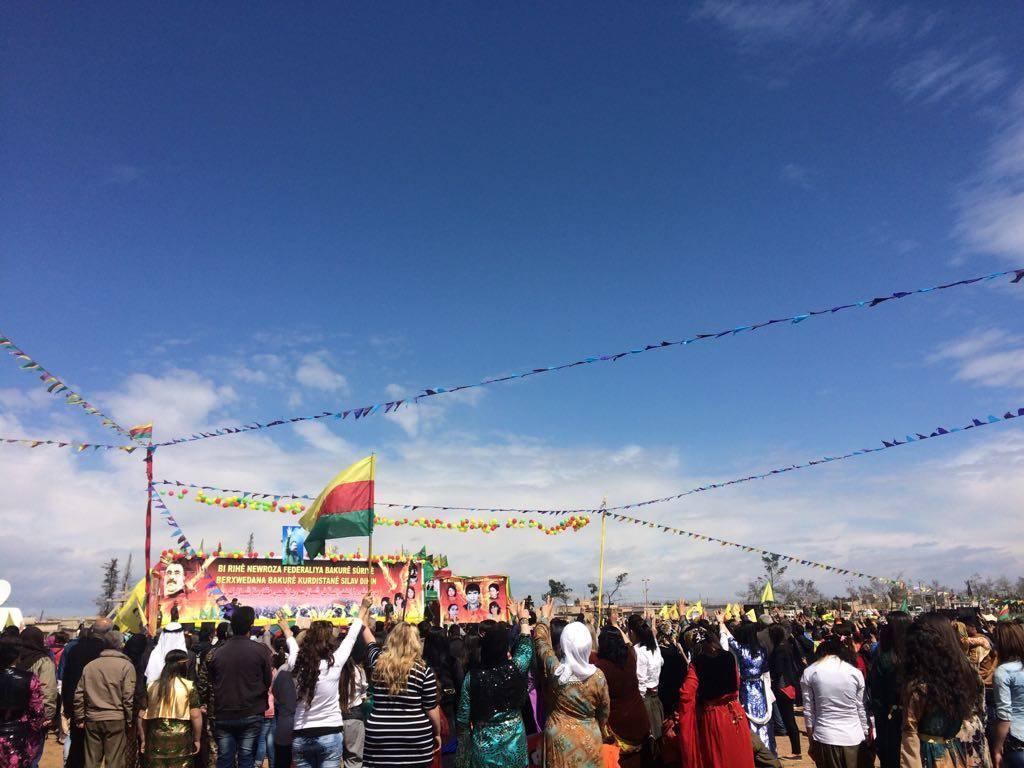
Photo: Newroz celebrations in Qamilso: “As spring slowly edges in the yearly fires of resistance have been relit, from Sengal to the mountains of Bakur the struggle continues.”
Photo Credits: Plan C
This interview was published in th blog of Yhdessä Rojavan puolesta [Together for Rojava] which is a Rojava and Kurdistan solidarity group working in Helsinki, Finland. Contact YRP through Facebook,Twitter or email YRP [at] riseup.net
</figure>
Rojava solidarity Helsingfors
Länk: http://rojavanpuolesta.tumblr.com/post/168154988130/experiences-in-rojava-an-interview-with-plan-c